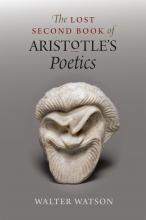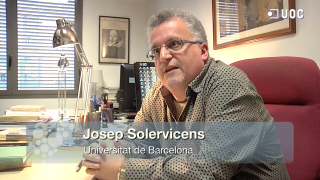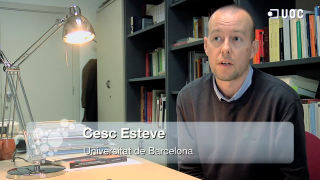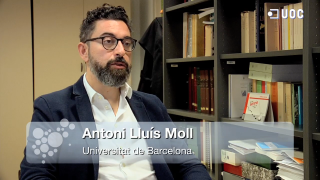The Lost Second Book of Aristotle's Poetics
Of all the writings on theory and aesthetics—ancient, medieval, or modern—the most important is indisputably Aristotle’s Poetics, the first philosophical treatise to propound a theory of literature. In the Poetics, Aristotle writes that he will speak of comedy—but there is no further mention of comedy. Aristotle writes also that he will address catharsis and an analysis of what is funny. But he does not actually address any of those ideas. The surviving Poetics is incomplete.
Until today. Here, Walter Watson offers a new interpretation of the lost second book of Aristotle's Poetics. Based on Richard Janko’s philological reconstruction of the epitome, a summary first recovered in 1839 and hotly contested thereafter, Watson mounts a compelling philosophical argument that places the statements of this summary of the Aristotelian text in their true context. Watson renders lucid and complete explanations of Aristotle’s ideas about catharsis, comedy, and a summary account of the different types of poetry, ideas that influenced not only Cicero’s theory of the ridiculous, but also Freud’s theory of jokes, humor, and the comic.
Finally, more than two millennia after it was first written, and after five hundred years of scrutiny, Aristotle’s Poetics is more complete than ever before. Here, at last, Aristotle’s lost second book is found again.
Of all the writings on theory and aesthetics—ancient, medieval, or modern—the most important is indisputably Aristotle’s Poetics, the first philosophical treatise to propound a theory of literature. In the Poetics, Aristotle writes that he will speak of comedy—but there is no further mention of comedy. Aristotle writes also that he will address catharsis and an analysis of what is funny. But he does not actually address any of those ideas. The surviving Poetics is incomplete.
Until today. Here, Walter Watson offers a new interpretation of the lost second book of Aristotle's Poetics. Based on Richard Janko’s philological reconstruction of the epitome, a summary first recovered in 1839 and hotly contested thereafter, Watson mounts a compelling philosophical argument that places the statements of this summary of the Aristotelian text in their true context. Watson renders lucid and complete explanations of Aristotle’s ideas about catharsis, comedy, and a summary account of the different types of poetry, ideas that influenced not only Cicero’s theory of the ridiculous, but also Freud’s theory of jokes, humor, and the comic.
Finally, more than two millennia after it was first written, and after five hundred years of scrutiny, Aristotle’s Poetics is more complete than ever before. Here, at last, Aristotle’s lost second book is found again.
Contents:
Introduction
- The Lost Second Book of Aristotle’s Poetics
- Aims of the Present Book
- Method to Be Followed
- Prospective Readers
Part I. Groundwork
Chapter 1. Aristotle’s Arts and Sciences
- The Organon
- Preface to the Theoretical Sciences
- Mathematics
- The Physical Sciences
- The Biological Sciences
- First Philosophy
- The Order of the Arts and Sciences
- The Practical Sciences
- The Productive Sciences: Poetics
- Rhetoric
- Scientific Rationality as a Guiding Idea
Chapter 2. Causes
Part II. The Symbolon Argument
Chapter 3. Causes in the Poetics
Chapter 4. Poetic Imitation
- The Analysis of Poetic Imitation
- The Scope of Poetic Imitation
- The Evolution of Poetic Imitation
Chapter 5. Expectations of Poetics II
Chapter 6. The Epitome of Poetics II
Chapter 7. Comparison of the Epitome with Our Expectations
Part III. The Kinds of Poetry
Chapter 8. Imitative Poetry
- The Autonomy of Imitative Poetry
- The Autonomy of Aristotelian Disciplines
- Autonomy of Art in the Aristotelian Tradition
Chapter 9. Historical, Educational, and Imitative Poetry
Chapter 10. Historical Poetry
- Historical Poetry
- Historical Poetry and History
- Historical Poetry and Imitative Poetry
- Historical Poetry and Rhetoric
Chapter 11. Educational Poetry
- Poetry and Philosophy
- Poetry and Education
Chapter 12. Transition to the Specific Ends of Imitative Poetry
Part IV. The End of Tragedy
Chapter 13. The End of Tragedy as Catharsis
Chapter 14. The Fearful Emotions
Chapter 15. The Removal of Emotions by Emotions
Chapter 16. The Aim of Tragedy: Symmetry
Chapter 17. The Mother of Tragedy: Pain
Chapter 18. Poetry and the Practical Sciences
- Poetic and Therapeutic Catharsis
- Is Catharsis in the Poem or the Audience?
- Is Catharsis Educative?
- The Practical Ends of Poetry
Part V. Comedy
Chapter 19. The Definition of Comedy
Chapter 20. The Mother of Comedy: Laughter
Chapter 21. The Laughable
- The Definition of the Laughable
- Accounts of the Laughable
- The Causes of the Laughable
- Laughter from the Diction
- Laughter from the Incidents
- Cicero’s Account of Laughter
- The Science of the Laughable
Chapter 22. The Embodiment of the Laughable in Comedy
- The Matter and Parts of Comedy
- Old, New, and Middle Comedy
Conclusion





